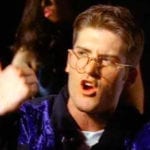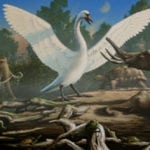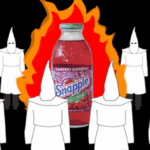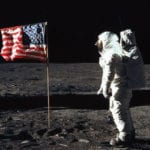 Weird Stuff
Weird Stuff  Weird Stuff
Weird Stuff  Animals
Animals 10 Inspiring Tales of Horses Being Human
 Mysteries
Mysteries Top 10 Haunting Facts About the Ghost Ship MV Alta
 History
History 10 Surprising Stories About the Texas Rangers
 Humans
Humans 10 Philosophers Who Were Driven Mad by Their Own Theories
 Miscellaneous
Miscellaneous 10 Video-Game-Worthy Weapons and Armors from History
 Weird Stuff
Weird Stuff 10 Psychics Who Accurately Predicted Wartime Events
 The Arts
The Arts 10 Pieces of Art Inspired by a Broken Heart
 Health
Health 10 Science Fiction-Sounding New Medical Treatments
 History
History 10 Surprising Facts About the Father of Submarine Warfare
 Weird Stuff
Weird Stuff 10 Times Real Laws Were Based on Bizarre Hypotheticals
 Animals
Animals 10 Inspiring Tales of Horses Being Human
 Mysteries
Mysteries Top 10 Haunting Facts About the Ghost Ship MV Alta
Who's Behind Listverse?

Jamie Frater
Head Editor
Jamie founded Listverse due to an insatiable desire to share fascinating, obscure, and bizarre facts. He has been a guest speaker on numerous national radio and television stations and is a five time published author.
More About Us History
History 10 Surprising Stories About the Texas Rangers
 Humans
Humans 10 Philosophers Who Were Driven Mad by Their Own Theories
 Miscellaneous
Miscellaneous 10 Video-Game-Worthy Weapons and Armors from History
 Weird Stuff
Weird Stuff 10 Psychics Who Accurately Predicted Wartime Events
 The Arts
The Arts 10 Pieces of Art Inspired by a Broken Heart
 Health
Health 10 Science Fiction-Sounding New Medical Treatments
 History
History 10 Surprising Facts About the Father of Submarine Warfare
10 Nearly Forgotten Number One Songs
As the decades pass, some songs increase in popularity when they reach new listeners via concerts, advertising, or movie soundtracks. Others aren’t readily available commercially, and thus become nearly forgotten.
This list is of outstanding songs many casual listeners will not be familiar with, and placed #1 on the Billboard US Hot 100 chart. Please feel free to post how many of the selections you have heard along with your comments.
(An explanation: I based this list on an American chart only because my knowledge of the music history of other countries is not adequate enough to do otherwise.)
Songs are arranged by date, most recent first.
London-born Maxi Priest (Max Elliot) hit the scene in the late 1980’s and was a success with his smooth blend of R&B, dance, and reggae music. This song, off his fourth album Bonafide, stands out as a genuine “love-making” song. Granted, not up to a Barry White level, though all but the most puritan will likely want to “get it on”. Max is still creating good music, including “That Girl”, (although extra vocals by reggae artist Shaggy hurt the song, IMO). He will be taking over the lead singing duties for the group UB40 (one of my favorites); coincidentally, UB40 was previously the only UK reggae artist to have a US #1 hit.
Trivia: The priest character in the comedy “South Park”, Father Maxi, is named after this artist.
Terence Trent D’arby blasted onto radio with his sizzling debut Introducing the Hardline in 1987. With a powerful, unique voice, Terence prompted more than a few critics to make comparisons to Sam Cooke and Smokey Robinson. Unfortunately, his arrogance and pretentiousness would set back a promising career. His follow-up album was self-indulgent and in cohesive, and though he attempted to return to the mainstream with later albums, he found once you alienate your fans, it can be difficult to win them back. His latest albums are available only through his website, under his new name Sananda Maitreya, which he chose after experiencing a series of dreams.
Trivia: A soldier in the US Army, Terence went AWOL (he was performing in clubs while stationed in Germany) and was court-martialed and discharged in 1983.
Perhaps too well-known a song to be listed here, I choose to invoke list-writer’s prerogative to include one of my favorite songs. Question Mark (or ?) and the Mysterians made their ‘mark’ on music with an early punk rock ode to a lover. Legend says that lead singer ? (Rudy Martinez) wrote the song initially as a poem titled “Too many teardrops”. When presented to the band, one member suggested the song be called “69 Tears” (wink, wink), though the band eventually agreed on a less suggestive title. The Wikipedia entry says the legend is false, but several fan sites I found state the tale as fact. ? was and is an outrageous personality, having made claims about living on Mars and seeing visions that he will be performing this song until the year 10,000!
Trivia: In January 2007, ?’s Michigan home burnt down destroying all his memorabilia and also taking the lives of six pets. Benefits have been held but ? is still without a proper home.
A great song with a great back story. Barry McGuire, broke after quitting folk group The New Christy Minstrels earlier in the year, was recruited by top producer Lou Adler to record some new tracks. In the studio and searching for something original, Barry pulled from his pocket a crumpled piece of paper with lyrics that band mate Phil Sloan (and possibly Barry; his official site is unclear on this) had wrote. He smoothed out the lyrics for himself, wrote the notes on paper from some carryout dinner bags for the band, and then started recording. Getting late, they recorded one take, (with Barry losing his place at one point), and decided to redo the vocals later. The next day, a music promoter would inadvertently take “Eve” to the birthday party of the daughter of a Los Angeles radio station executive. The kids loved the song and the promoter told Adler. Unable to find his lead singer, he made a master of what he had, to send to the station. Only four days after being recorded, Barry McGuire would have a song playing on LA’s top rock station.
Trivia: “Eve” would be used as a protest song during the Vietnam War era, though Barry had not envisioned it as such. The song’s popularity would lead to hate mail and an FBI file for him. He still performs it today, updating the lyrics for today’s events.
Brother and sister Nino Tempo and April Stevens did a cover version of the popular song that was initially conceived as a piano composition in 1933. The piece’s popularity lead to lyrics in 1939, which then lead to hit versions by artists such as big band group The Larry Clinton Orchestra and doo-wop group The Dominoes. In the second half of this version, April speaks the lyrics softly prior to Nino singing them; apparently he forgot the words and was being prompted by April. Of course, the producer left her helping in, despite a mild protest by Nino. A gentle, sweet song about an old flame they just don’t make anymore.
Trivia: Another brother and sister act, Donny and Marie Osmond would cover the song in 1976, hitting the top 20. IMHO, this might be the most lightweight singing I’ve ever heard!
Here’s a song you have heard many times…sort of. A hit in his native Japan in 1961, Kyu Sakamoto sang “Ue o muite aruk?”, a song about a painful break-up. It would reach the UK in 1963, through a instrumental version by Kenny Ball and the Jazzmen. Their record label Pye Records gave the song an easier to pronounce title, and this name would stick when Kyu’s version would make it to the UK and US later that year. Many artists would cover the song either through the music only or by making up their own lyrics. The most notable was by A Taste of Honey in 1981; the lyrics written by their singer Janice Marie Johnson (“It’s all because of you, I’m feeling sad and blue…”) would become a standard of sorts for future versions. The Japanese lyrics are entirely different; “I look up when I walk, so tears won’t fall”. As usually is the case, the original is the best. Kyu’s voice stands along side Perry Como and Andy Williams as the best of the era.
Trivia: Sadly, Kyu Sakamato was among 520 people who perished in the crash of Japan Airlines Flight 123 in 1985.
A trippy mix of space-age effects and distortions using an electronic instrument called the clavioline. Unique and imaginative (and unable to write music or play an instrument!) producer Joe Meek wrote this song and named it after a recently launched AT&T communications satellite. He hired club/house band The Tornadoes to record it, and then added more effects afterwards. The song was an immediate hit; however, due to a plagiarism lawsuit by French composer Jean Ledrut (eventually ruled in Meek’s favor), Meek would see no royalties in his lifetime. Meek was a flamboyant personality dealing with paranoia, a obsession with the occult, and his homosexuality. There have been many songs, a play, and a major movie later this year with Kevin Spacey (not as Meek) about his life.
Trivia: Meek was also obsessed with Buddy Holly, and would eventually kill himself and his landlady eight years to the day of Holly’s death.
From a small record label in Norfolk, Virginia came a big dance hit by Gary U.S. Bonds. This is a raucous, high energy dance track that fits right in with current tracks by OutKast and The Black Eyed Peas. Born Gary Anderson, he would be renamed by his producer as a gimmick; they would send out demos labeled “Buy U.S. Bonds”, (government bonds were a popular investment at the time). It worked, now Gary U.S. Bonds is recognized as a beloved performer on the nostalgia concert circuit. He will be touring the eastern US this summer.
Trivia: Bruce Springsteen is a huge fan and has performed “Quarter to Three” at many of his concerts. He also produced a successful comeback album for Bonds in 1981.
I am unsure whether this song was meant to be an attempt to acknowledge the rock and roll revolution, or to mock it. Either way, the second-best selling single of 1956, had Kay Starr’s lovely, deep voice going for it. She is not often remembered because much of her career she had been at Capitol Records, behind big-name talent like Jo Stafford and Peggy Lee. It was a move to RCA that lead to this hit. Kay has been recording as recently as 2001, at age 78!, on a Tony Bennett album.
Trivia: Kay lost her voice in 1945 due to pneumonia and nodes on her vocal cords. Rather than undergo surgery, she chose to not speak for six months! This changed her voice considerably, but certainly not for the worst.
It is amazing how much musical tastes change. A song like this would never work today, but at the time it was immensely popular, and was recorded by several artists at the same time as this Phil Harris version. It’s corny, sure, but I bet you’ll be tapping bump-ba-bump by the end of the song!
Trivia: Phil Harris was a popular all-around entertainer and would voice “Baloo” in the Disney feature The Jungle Book.
Contributor: islanderbst








